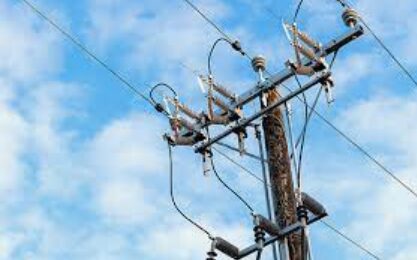Power generation on the national grid crashed to 59.9 megawatts around 12 pm on Sunday as the country’s grid witnessed a nationwide collapse.
Data obtained from the Federal Ministry of Power showed that electricity generation on the grid plunged from 2,658.75MW at 11 am to 59.9MW by 12 noon on Sunday, as power distributors lost supply from the grid.
This led to widespread blackouts across the country, as power distribution companies blamed it on the collapse of the grid managed by the Transmission Company of Nigeria, an agency of the Federal Government.
Kaduna Disco, for instance, confirmed that the loss of bulk power supply left Kaduna, Sokoto, Zamfara, and Kebbi states in darkness on Sunday.
Also, the Management of Abuja Electricity Distribution Plc informed its customers in a public notice that “the power outage being experienced is as a result of a system failure from the national grid at 11:21 hours today, February 4, 2024, which has led to a nationwide power outage.”
It, however, added, “Be rest assured that we are working with the relevant stakeholders to restore power as soon as the grid is stabilised. We appeal for your patience.”
A statement by the Kaduna Disco Head of Corporate Communications, Abdulazeez Abdullahi, also confirmed the development on Sunday.
According to Abdullahi, the power supply would be restored as soon as the Disco received bulk supply at load centres across its franchise.
“The Management of Kaduna Electric wishes to inform its esteemed customers that it has lost bulk power supply hence the outage being experienced currently in Kaduna, Sokoto, Zamfara and Kebbi states.
“Power supply shall be restored to our customers as soon as we receive the same at load centres across our franchise. We sincerely apologise for the inconvenience,” the statement read.
Figures from TCN showed that after crashing to 59.9MW around 12 pm, power generation on the grid moved up to 174MW by 1 pm, and further rose to 446.7MW, and 776.2MW at 2 pm and 3 pm.
It dropped marginally to 709MW at 4 pm, picked up to 996.5MW at 5 pm and grew to 1,051.4MW around 6 pm when this report was being compiled.
Recall that on December 12, 2023, The PUNCH reported that Nigeria witnessed a system collapse of its national grid, leading to a crash in power generation from 4,032.8MW to 43.5MW the preceding day.
Power generation figures obtained from TCN at the time showed that electricity on the system moved up to 115.4MW around 3 pm on December 11, 2023, before rising further to 240.9MW at about 4pm.
It climbed to 544.9MW at 5 pm and continued the upward trend, as TCN strived to restore the national grid.
Commenting on the development at the time, the spokesperson of the transmission company, Ndidi Mbah, confirmed the collapse of the grid but was quick to state that the system was restored by TCN engineers.
“The grid experienced a collapse today (Monday). Presently, it (supply) has been restored except for the Jos axis, which will soon have supply within the hour. The collapse happened by 13.49 pm this afternoon. It is now fully restored by 18.51 pm,” she had stated.
Nigeria’s power grid witnessed a series of collapses in September last year, as power consumers lambasted the managers of the system for the incessant crash of the grid.
On September 20, 2023, The PUNCH reported Nigeria witnessed another round of widespread blackouts across the country the preceding day as the national power grid collapsed again, making it the third grid collapse in about five days during that period.
This is despite the privatisation of the successor generation and transmission arms of the power sector in November 2013 by the Federal Government.
Meanwhile, the power ministry announced in a statement on Sunday that the Minister of Power, Chief Adebayo Adelabu, met with top management teams of power generating companies and distribution companies in a bid to find a lasting solution to blackouts in Nigeria.
Bolaji Tunji, Special Adviser, Strategic Communication and Media Relations to the minister, quoted Adelabu as saying that there was a noticeable improvement in power supply during the yuletide, but the situation changed in the new year with poor supply leading to blackouts.
The minister said his investigation revealed that the poor supply was due to low gas supply to Gencos.
“It was based on the need to understand the challenges first hand that led to inspection visits to power facilities in Olorunshogo in Ogun State and Omotosho in Ondo State. The problem is traceable to a low supply of gas and we need to resolve this as quickly as possible,” he stated.
The meeting also discussed issues of indebtedness to Gencos by the Nigeria Bulk Electricity Trading Company.
“We are aware that the sector has liquidity challenges, but we need to have a minimum threshold, we are working on revalidating the debt and determining a fair resolution,” Adelabu stated.
He further spoke on the need by Gencos to enter into contractual arrangements with gas suppliers to ensure a steady supply of gas to generating companies.
“We know that there are certain concessions expected of the government before this could be achieved and we are willing to work on this to stabilise the power sector,” the minister stated.
To resolve the gas impasse and the liquidity issue, the minister assured the power sector operators that a committee would be set up comprising all stakeholders to come up with appropriate recommendations.
“To tackle the gas supply and liquidity challenges, I’ve decided to form a committee involving all stakeholders. Together, we will work on recommendations to resolve these issues and ensure a more reliable and consistent power supply for our citizens,” he stated.
SOURCE: PUNCHNG











